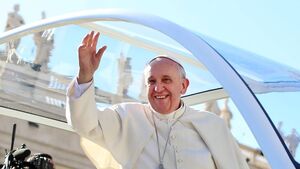Fr Paddy Byrne: Pope Francis was a true revolutionary

Pope Francis
THE DEATH of Pope Francis fills me with a deep sadness as we mourn the loss of a kind, courageous and gentle pastor.
I also have a sense of gratitude to God for the great leadership he has given to the Church over the course of his papacy. The first Latin American to be pope, he insisted right from the start that a key focus of his pontificate would be on ‘the peripheries’.
His preaching, teaching and travels brought him to many of the poorest and most marginalised communities on the earth to remind them of their human dignity as children of God. He urged politicians and other leaders there, and everywhere, to work for peace, justice and responsible economic development.
The plight of the peoples of Gaza, Ukraine and in so many other theatres of conflict was constantly on his lips and in his prayers. He urged an end to violence in human affairs and underlined the need for a sense of fraternity and social friendship between peoples and nations in order to build a more just and peaceful world.
In terms of the life of the Catholic Church, at least four persistent themes reflect the teaching and preaching of Pope Francis. First: the importance of mercy, recognising that God is ever merciful and that we are called to respond to this great truth and to be merciful ourselves in our relationships with one another. Second: hope – evidenced by the current Jubilee Year of Hope 2025 – underlining the need to trust in the power of the Holy Spirit in our lives and thus not to give in to despair or anger. Third: synodality, a vison of Church faithful to the teachings of the Second Vatical Council (1962-65), which has at its heart the need to develop a greater sense of co-responsibility in mission between clergy and people everywhere. Fourth: his teaching on the need to care for the earth as set out in his encyclical, where he called for a global dialogue that would allow us to shape and care for our planet through our daily actions and decisions.
Pope Francis lived a prophetic life, who not just talked a good talk but more importantly walked the walk. Throughout life, his pathway has been informed by Jesus Christ. Pope Francis was a shepherd to those on the periphery. He is universally recognised as perhaps the most significant world leader of the new millennium. In a turbulent and often polemical world, his voice always brought a sense of reason and balance. I have no doubt that his pontificate historically will be significant.
Francis’s pontificate was tagged as surprising from the start. In February 2013, Benedict resigned, the first pope to step aside in nearly 600 years. Jorge Mario Bergoglio of Buenos Aires, Argentina was elected the next month: the first Jesuit pope, the first pope from the Americas, and the first to take the name Francis – in emulation of Francis of Assisi, the medieval Italian saint known for 'holy poverty'. His rapport with the public suggested that he had been changed by his election – that a man known to many Argentinians as dour and circumspect had been infused with what he calls “the joy of the Gospel”.
Throughout his life, Francis has been passionately concerned about the poor, and he knows that poverty in the 21st century takes many forms. It can be found in the grinding material poverty of his native Buenos Aires, caused by decades of corruption, indifference and the Church's failures to catechise Argentina's economic and political leaders. But poverty can also be found in the soul-withering spiritual desert of those who measure their humanity by what they have rather than who they are, and who judge others by the same materialist yardstick.
Pope Francis was a revolutionary. The revolution he proposed, however, was not a matter of economic or political prescription, but a revolution in the self-understanding of the Catholic Church: a re-energising return to the Pentecostal fervour and evangelical passion from which the Church was born two millennia ago, and a summons to mission that accelerates the great historical transition from institutional-maintenance Catholicism to the Church of the New Evangelisation.
Soon a conclave will take place. Pope Francis has appointed the majority of cardinals who will elect his successor. The appointment of these electors has been prophetic. Francis has created a College of Cardinals that truly represent the universal Church. Pope Francis has both challenged and inspired. I see him as a Christ-like compassionate shepherd who ‘Brings good news to the poor’. May the Lord grant to this faithful servant everlasting rest.




